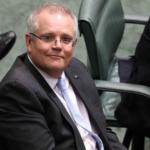Morrison’s Public Humiliation of Former Aust Post CEO: Yet Another Example of Misogynistic Leadership

Prime Minister Scott Morrison’s handling of the Cartier Watches saga at Australia Post, in particular his treatment of former CEO Christine Holgate, has exposed the ‘toxic boys club’ within the country’s leadership.
The PM is currently trying to distance himself and backtrack on comments he made in Parliament several months ago, but evidence from this week’s Senate Inquiry has revealed that his uninformed outburst calling the spending of $20,000 on four Cartier Watches “disgraceful” was not only made based on limited, unverified information, it effectively destroyed the reputation of one of Australia’s most capable businesswomen.
No misuse of funds
In her testimony to the Senate Inquiry, Christine Holgate said the expenditure for the watches was well within her signing authority, signed off by the previous Chairman, and signed off by both the Chief Financial Officer and the company’s auditors.
It has also been revealed that the subsequent ‘Maddocks Review’ into the spending which was insisted upon by the Morrison Government, also determined that the expenditure was legal.
The Maddocks Review findings state clearly that while the purchase of the watches was “inconsistent” with the obligations set out by the Public Governance, Performance and Accountability Act, it did not amount to corruption. And yet somehow, Christine Holgate was forced to leave Australia Post because of it.
Ms Holgate also revealed to the Senate Inquiry that she could have in fact rewarded the executives involved with financial bonuses worth up to $150,000. She chose instead to give them a personal memento, worth about $3,000 each.
‘Public humiliation’ and vilification
The Prime Minister not only publicly humiliated Ms Holgate with his carelessly worded outburst in Parliament, he essentially forced her out of her job without consideration for the facts: The value of the watches was only a fraction of the value of the $200 million deal secured by Australia Post’s senior executives which saved around 3,000 community post offices within the Licensed Post Office network, thousands of jobs, and kept banking options available to rural and regional communities.
Furthermore, the inquiry heard, after the Prime Minister said “she could go”, the Chairman of Australia Post Luciano Di Bartolomeo then bullied Ms Holgate out of her job, telling politicians she had already resigned, when in fact, she had no intention at the time of doing so.
Both Ms Holgate and Mr Di Bartolomeo have recalled very different accounts of how Ms Holgate left Australia Post. Mr Di Bartolomeo insists she departed voluntarily. Ms Holgate says she was forced out unlawfully, essentially ‘ordered’ to go by the Prime Minister who did so on, it would appear, on the basis of ill-informed assumption and misinformation.
No apology
In his own testimony, Mr Di Bartolomeo admitted that Christine Holgate was treated “abysmally” over the watches saga, he also admitted she was good at the job. But he also insists the board does not owe her an apology.
For those of us sitting on the sidelines, this appears to be the kind of sheer arrogance typical of a culture of toxic masculinity.
If it can be accepted that there was a misunderstanding and harm was inflicted – intentionally or otherwise – then why is an apology so difficult to muster?
The Prime Minister and Mr Di Batholemew have both been accused of bullying by Ms Holgate, making her leadership at Australia Post no longer tenable.
The Senate inquiry provides the same parliamentary privilege protections as speaking to parliament which means that anything said is not subjected to defamation laws.
Ms Holgate’s testimony has been blunt and clear – she says she was “thrown under the bus” for no wrongdoing whatsoever. When the story found its way into the media, Ms Holgate was vilified and yet none of the men who were in positions to defend her did so.
Double standards of accountability
Ms Holgate has been very forthright about the impact the incident has had on her personally, along with the cost to her professional reputation.
There are also many unanswered questions about double-standards of accountability and whether a man in her position would have been subjected to the same treatment. There are questions around the PM’s behaviour and whether it amounts to an abuse of power.
‘Abuse of power’ and gender bias have become strong narratives over the past few months as a result of the serious allegations coming out of Parliament House, something which Scott Morrison has been, in the eyes of many, not only very slow to acknowledge but inept in doing so when he fronted the general public.
Ms Holgate’s experience has only added more fuel to the fire, because now, in light of everything that has been exposed about the handling of the Cartier Watches saga, overwhelmingly Australians now stand firmly on her side. Will there be repercussions for the men who stand accused of harassing and humiliating her? Only time will tell.







